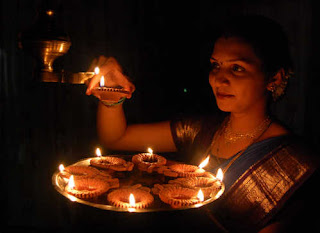
During this five-day long festival, thousands of rockets will go whizzing up into the dark sky and burst open in myriad showers of bright colors, children in every little lane, nook and cranny of cities, towns and villages will light up fire wheels - we call them charkas - and watch in glee as they dance round and round, ear deafening bombs will be set off, flower pots will bloom open in fountains of brilliant hues, the little ones’ eyes will sparkle as brightly as the sparklers they swing round and round, and long strings of electric firecrackers will be set off with their unending spitting and spewing. According to tradition, the custom of lighting up homes with diyas, or oil lamps, and lighting up the skies with fireworks during the Diwali festival are a way of expressing reverence to the gods in the heavens for bestowing prosperity, peace, knowledge, wealth, and health.
One of the most loved festivals of India, Diwali is celebrated with great jubilation and rejoicing all over the country, as well as by the substantive Indian diaspora that has spread all over the world. It is called the ‘festival of lights’ because it is the custom to place lighted diyas all around the house – on windowsills, doorways, roof-tops, verandahs, balconies, courtyards, gardens, on the outer walls – in fact, in every nook and cranny. Beautiful rangoli patterns are made on every doorstep along with patterns of little feet, depicting Lakshmi (or prosperity) entering the house. Being a celebration of the Lunar New Year as well as a harvest festival, Diwali is also imbued with powerful astrological significance and energies.
Apart from lighted lamps – these days replaced to a large extent by strings of electric lights – the festival of Diwali is also marked by exchanging sweets and gifts between family, friends, and these days, more and more as expensive corporate giveaways. New clothes are bought and worn, houses are spruced up, something new is bought for the house as a mark of auspiciousness, and traditional food and sweets are made and enjoyed with great gusto. Basically, it is the enduring renewal of life itself that is celebrated with the transitioning of the old lunar year into the new lunar year according to the Hindu calendar. The word ‘Diwali’ itself, derived from the Sanskrit ‘deepavali’, which means ‘a garland of lamps’ is a vivid depiction of this joyous festival that brings so much sparkle and merriment into everybody’s faces.
Befitting the great diversity that embodies India, with her innumerable languages, cultures, social mores, dressing styles, physical features of the people that inhabit this vast land, foods… the list is endless, really… so are Indian festivals. Hence, Diwali has different connotations in various parts of the country. While in North India Diwali is celebrated by burning effigies of Ravana, the demon king who Lord Rama defeated and then returned home victoriously to Ayodhya after 14 years of exile, to be crowned king, signifying the victory of the virtuous over the unrighteous, in the western state of Gujarat this festival is marked by honoring Lakshmi, who is the goddess of wealth.
For the Jains, the day of Diwali is a commemoration of Lord Mahavira (a great seer who is held in as much reverence in India as is Lord Buddha) passing into Nirvana – which in Hinduism, Jainism and Buddhism means reaching a state of such beatitude that it transcends the cycle of reincarnation, characterized by the extinguishing of suffering, desire and individual consciousness. The lamps of Diwali are lit as a way of substituting them for the extinguishing of the light of divine knowledge with the passing of Lord Mahavira.
In the eastern state of Bengal, Diwali coincides with the much-celebrated Kali Puja (puja is the act of showing reverence to the divine through rituals, prayers, songs, and invocations). According to the mythology of Hinduism, Goddess Kali was one of the incarnations of the Goddess Durga. Kali, depicted with a terrifying and fierce face, is the more aggressive manifestation of Durga. She is revered as the Mother Goddess who fights fiercely for justice and destroys all evil. Like in the rest of the country, Kali Puja too is marked by bursting firecrackers, lighting lamps, decorating the house with colorful patterns made at the doorstep, and elaborate puja carried out at midnight, through which people seek the blessings of the Goddess, prosperity, happiness, and protection against adversity.
In South India, Diwali is a commemoration of the defeat of Asura Naraka, a demon king. Legend has it that when Lord Krishna finally subdued him and asked him for his last wish before being killed, the demon king replied that he wished to enjoy his last day celebrating in a grand manner, and hence giving birth to Diwali being celebrated with lighted lamps, firecrackers, sweets, doorsteps of houses decorated with kolam patterns, made with colored powders, new clothes, and so on – a tradition that continues to date.
In whatever form Diwali may be celebrated, this unique festival is about light, noise, joy, ebullience, and mirth, bursting boisterously all around, all of which is rooted in the ancient culture of this land. And while there are sanctimonious nay-sayers who talk piously about the so-called "terrible commercialization" of the festival and moan about the "terrible noisiness" of the celebration, Indians being Indians – we will just go ahead and send off another salvo of colorfully noisy rockets into the Diwali sky and wish everybody – including the pious moaners and the sanctimonious nay-sayers – A Very Happy Diwali to You! May the Season bring Enlightenment, Joy, and Prosperity to One and All!
No comments:
Post a Comment